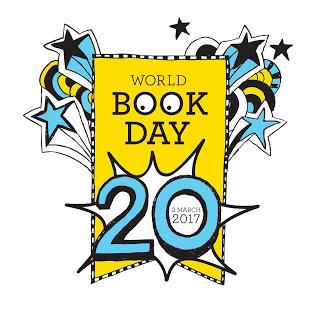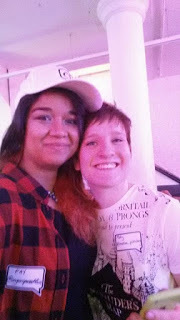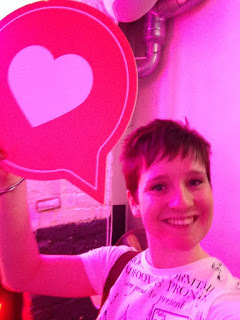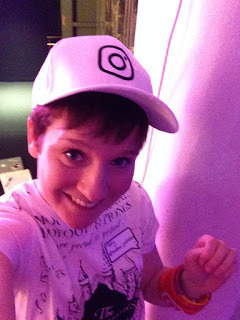Molly Looby's Blog, page 3
March 8, 2017
Awesome Female Protagonists Written by Women! IWD 2017
 As I've been doing these blogs for a few years, I was stuck for something to list. I love a list, don't you? I've already listed my favourite female characters and authors. But I realised I haven't listed my favourite books with strong female protagonists written by women. So that's what I'm doing!
As I've been doing these blogs for a few years, I was stuck for something to list. I love a list, don't you? I've already listed my favourite female characters and authors. But I realised I haven't listed my favourite books with strong female protagonists written by women. So that's what I'm doing!I decided to do a top ten just to make it more difficult! So here they are (alphabetical by author):
Wuthering Heights - Emily BronteThe Hunger Games trilogy - Suzanne CollinsUnearthly trilogy - Cynthia HandMaybe One Day - Melissa KantorDivergent trilogy - Veronica RothThe Forest of Hands and Teeth trilogy - Carrie RyanDaughter of Deep Silence - Carrie RyanThe Wolves of Mercy Falls trilogy - Maggie StiefvaterRephaim series - Paula WestonDustlands trilogy - Moira Young
What are your favourites?
Molly LoobyAuthor / Editor in Chief at Molten Publishing / Freelance Editor / Writing Coach / Reviewer / Blogger / Wrimo / Movellian / ZA Ready
molly@moltenpublishing.co.uk
Visit me on Facebook / Twitter / LinkedIn / Instagram / Pinterest / Movellas / NaNoWriMo
Published on March 08, 2017 00:12
March 6, 2017
Genre: Mountain Trolls or Victorian Maidens?
Picking a genre isn't so much you thinking about genres and deciding what you want to write. Most of the time, the genre picks you. To butcher Harry Potter, the genre chooses the writer. Usually, you end up writing what you most read, because that's what you most love, and also, without realising it, you've already put thousands of hours of research in just by reading that genre.
I'm not here to tell you which genre to write in. The beauty of genre is that there's no right or wrong. Just write whatever you love to write.
When you've picked your genre, you have to pay attention to who your readers are. If you write crime for example, your readers are likely to be different from those who read romance. Once you know who your readers are, learn what they do and don't like about the books they read. Goodreads is a great place to discover this. If your readers aren't fans of swearing, don't swear. If they love an action scene, make sure to include some great action along the way. If they're all about dialogue, don't bore them with two pages of description.
With each genre there are certain expectations. We need to find out who did it; the two main characters have to end up together; the aliens must be conquered; we must learn something. What's expected of you depends on your genre. And once you know what your readers expect, you'll know which rules you can break. Breaking the rules and giving your readers something they don't expect can leave you with a book everyone's talking about. However, break the wrong rules and people will be dissatisfied.
Now, if you're looking for a challenge and want to grow as a writer, I suggest writing in a genre totally new to you. Don't worry, you don't have to show anyone! Changing genre every once in a while can really keep you on your toes as a writer. If you throw yourself into a challenge like this, your writing will improve in this new genre, as well as in your trusty favourite genre. You get to a point in your writing where you feel like you've stopped improving, and this is when you need to do some scary experiments to keep your skill growing. It's the same with anything. Once it gets easy, make yourself work harder!
Genre is personal and nobody can tell you what to write. However, switching it up every once in a while will help you push your writing to the next level.
Molly LoobyAuthor / Editor in Chief at Molten Publishing / Freelance Editor / Writing Coach / Reviewer / Blogger / Wrimo / Movellian / ZA Ready
molly@moltenpublishing.co.uk
Visit me on Facebook / Twitter / LinkedIn / Instagram / Pinterest / Movellas / NaNoWriMo
Published on March 06, 2017 07:44
March 2, 2017
Top 10 Stand-Alone YA Novels for World Book Day!

Last year I made a list of my top ten favourite book series. This year I'm celebrating the stand-alone novel!
Here are my top 10 stand-alone YAs (alphabetical by author):
Beautiful Broken Things - Sara BarnardThe Reapers are the Angels - Alden BellBefore I Die - Jenny DownhamPaper Towns - John GreenThe Fault in Our Stars - John GreenThe Rest of Us Just Live Here - Patrick NessBefore I Fall - Lauren OliverDaughter of Deep Silence - Carrie RyanThe Art of Being Normal - Lisa WilliamsonThe Book Thief - Markus Zusak
What are your favourite stand alone novels?
Molly LoobyAuthor / Editor in Chief at Molten Publishing / Freelance Editor / Writing Coach / Reviewer / Blogger / Wrimo / Movellian / ZA Ready
molly@moltenpublishing.co.uk
Visit me on Facebook / Twitter / LinkedIn / Instagram / Pinterest / Movellas / NaNoWriMo
Published on March 02, 2017 00:25
February 27, 2017
The Art of Description
Description really is the bulk of a story, and a lot of people try and sidestep it as much as they can. I must admit, I used to be one of those people. Description would take me much longer to write, and I'd have to really think about it, so I'd tend to whizz past where I could. I'm a type, type, type and never stop kind of person. But it really makes a difference when you slow down and take a look.
The perfect balance with description can sometimes be hard to find. Too much and the reader will get bored and start skimming (guilty). Too little and the reader won't be able to picture what's going on. You want your reader to live in your story, but you don't want them to drown there. There is no strict rule about what's too much or too little. Personally, a full A5 page is too much for me. If a book's got a whole page of description, I'm afraid I will skim over it. I want action, action, action! Sorry, Bram Stoker, but you kept describing trees over and over, and all I wanted to know about was the scary vampire!
To make sure you've got the basics covered, check you've described at least a little bit of your character's appearance, their surroundings, and any events that are taking place. Also, make sure you're 'showing' the reader and not 'telling' them. If you were showing a friend around your new house you wouldn't point to your grandmother's china plates and say, "they're old". I'm sure they can work that out for themselves. Your friends aren't stupid and neither are your readers.
This mostly irritates me when people are trying (and failing) at writing emotion. Never state an emotion! Especially in your main character. Don't say, "I am so frustrated about people stating emotions", say, "the idea that some people still state emotions in their writing makes my skin crawl". Don't say, "I am overjoyed when people describe emotions", say, "when people describe emotions, a ball of light comes to life in my chest, and I can't help the smile on my face". See? You will achieve so much more this way. The reader will be living in the world with you instead of jumping up on their tiptoes, desperate to press their faces against the window.
And no clichés. No. None. Don't use them. They're so lazy. Show your reader you're a skilled writer. Please never say something was as "quiet as a mouse". When I read that--or any other cliché--nothing happens in my brain. It doesn't even register in my head. You need your readers to take notice. Plus, there are hundreds of things that are quieter than mice.
Description isn't as hard as you think it is, as long as you put in the time and effort to get it right.
Molly LoobyAuthor / Editor in Chief at Molten Publishing / Freelance Editor / Writing Coach / Reviewer / Blogger / Wrimo / Movellian / ZA Ready
molly@moltenpublishing.co.uk
Visit me on Facebook / Twitter / LinkedIn / Instagram / Pinterest / Movellas / NaNoWriMo
Published on February 27, 2017 07:45
February 20, 2017
Dialogue and Chatter
Dialogue shouldn't be the pain in the butt some people think it is. After all, we hear people talking all day every day, and we know our spoken language better than anyone. Once you know your characters and your voice for narration, dialogue should be a doddle.
The thing most writers struggle with is making dialogue sound natural. I must confess, dialogue was the first thing I truly nailed when I first started writing, but I think that's because I write in a very casual sort of way. If you can spin the most detailed and beautiful description, I'm guessing dialogue was more difficult to grasp. Something I've realised over the years is that people who 'get' description first struggle with dialogue and vice versa. They're two entirely different skills.
In your first draft, you should just go for it. Type your dialogue as fast as you can and have the characters' conversations out loud so you can hear them. I find that if something's not quite working, I'll never pick it out reading in my head. You must read dialogue out loud to understand it. When you read aloud, you notice that no one says can not anymore. Everyone says can't. In my novels, I go as far as wanna instead of want to with some characters.
It may make you cringe, but some characters won't use words correctly, and they won't speak in perfect sentences. Depending on where you're from, people say all sorts of things that don't make sense in the literary world. Ain't is common where I live, and we all know that isn't really a word.
I'm not saying to pepper your dialogue with slang, but a few choice words here and there will make the dialogue feel so much more natural. Whatever you do, don't feel the need to be technically correct. Your characters can say things that would make you cringe if you were to write them in any other way. People are expressive and excitable. We humans ask so many questions in a row and tend to not wait for the answers. We exclaim a lot too. (Though exclamation marks embarrass some people - me included to be honest. I only ever use them in dialogue.)
Once you've played around a bit, you can make each character's 'voice' distinctive. Some will be sarcastic. Some talk a lot and always want the last word. Some only speak when they have something important to say. Some will exclaim a lot and be more excitable than others. It's so useful to write dialogue in such a way that the reader immediately knows who's speaking. It can take away the pain of having to type 'said' all the time.
Before you get too carried away, make sure all your dialogue has a point. Sometimes I go off and have a fantastic conversation between some of my characters, only to come back and cut the entire thing because it didn't go anywhere. Chatting in real life doesn't usually go anywhere, but in your story, it must have some sort of reason to be present.
Dialogue is so important. It plunges your reader into your world and also gives you a way into secondary characters' heads. The things they say and how they say them are so important for getting to know them better. If you're lacking dialogue, you're also lacking heart.
The only other tip I have is to listen. Whenever you're having a conversation, listen to its flow. When you're in a queue, listen to the people chatting around you. Immerse yourself in the art of human conversation and make note of how sometimes (in fact most of the time) it's not what people are saying, it's how they're saying it, and how they're standing/looking at you. Sometimes a picture really does paint a thousand words.
So go, newly inspired chatterboxes! Go and irritate everyone in your search for perfect natural dialogue.
Molly LoobyAuthor / Editor in Chief at Molten Publishing / Freelance Editor / Writing Coach / Reviewer / Blogger / Wrimo / Movellian / ZA Ready
molly@moltenpublishing.co.uk
Visit me on Facebook / Twitter / LinkedIn / Instagram / Pinterest / Movellas / NaNoWriMo
Published on February 20, 2017 07:29
February 14, 2017
Favourite Fictional Couples

Happy Valentine's Day, everyone!
In celebration, I thought I'd list my top ten favourite fictional couples! Functional or dysfunctional, meant-to-be or doomed, who doesn't love a love story?
Caine and Diana (GONE series)
Cas and Anna (Anna Dressed in Blood duology)
Cassie and Evan (The 5th Wave trilogy)
Cathy and Heathcliff (Wuthering Heights)
Gaby and Rafa (Rephiam series)
Hazel and Augustus (The Fault in Our Stars)
John and Sarah (Lorien Legacies series)
R and Julie (Warm Bodies)
Sam and Grace (The Wolves of Mercy Falls series)
Nora and Patch (Hush, Hush series)
[image error] Love Molly x
Molly LoobyAuthor / Editor in Chief at Molten Publishing / Freelance Editor / Writing Coach / Reviewer / Blogger / Wrimo / Movellian / ZA Ready
molly@moltenpublishing.co.uk
Visit me on Facebook / Twitter / LinkedIn / Instagram / Pinterest / Movellas / NaNoWriMo
Published on February 14, 2017 05:00
February 13, 2017
Narration: The Perfect Voice
Narration can be both the easiest thing in the world and the most difficult depending on who's telling the story. It's crazy how different characters can narrate in different ways. Some are eloquent and thoughtful and others just want to jabber away. Some implore the reader to understand, others ignore the reader completely. The only thing that matters is that you pick the right voice.
I find narration can make or break a story. A 'voice' that I love will have me reading and reading. A 'voice' that grates on me is unlikely to get read to the end.
The most important thing to do is to make the narrator engaging and relatable, whichever way you tell the story. Decide whether you want your narrator to be funny, dramatic, poetic, emotional, whatever it is that works best for your story. Why are they telling the story? Are they the best person to? Why?
I cannot stress how powerful it is to keep asking yourself that simple question. Why?
There are a few ways you can go about narration. You have two choices of tense: past or present. You also have two choices of person: first or third. (Don't get me started on second person and future tense. Last time I said they couldn't be used in a full-length novel, I had an uprising on my hands.) What you use is up to you, and I encourage you to try them all. Once you've had a go at everything, you can decide what feels most natural for you.
I always write in the first person past tense. The third person felt too distant to me, and I kept falling out of the present tense. Let me tell you, the past tense doesn't mean you're not right in the now. You can be clever and make the past tense sound immediate. And if you want to write from more than one person's point of view and you're using the first person, just have another point of view character (but make sure you have a break between the two voices!).
It's not for me to tell you how to do this. But please think about who's telling your story, what they're like, and why they're the one to be telling it.
Narration can make or break you, so pick the most qualified character for the job!
Molly LoobyAuthor / Editor in Chief at Molten Publishing / Freelance Editor / Writing Coach / Reviewer / Blogger / Wrimo / Movellian / ZA Ready
molly@moltenpublishing.co.uk
Visit me on Facebook / Twitter / LinkedIn / Movellas / NaNoWriMo
Published on February 13, 2017 07:34
February 6, 2017
Instagram Livestameet
On Saturday, I was lucky enough to be invited to Instagram's first "Livestameet" where a few awesome people were going to be gathered together to go live on Instagram at the same time.
 A room full of amazing women! (Fay and I did not mean to co-ordinate!)
A room full of amazing women! (Fay and I did not mean to co-ordinate!)
Going live was bizarre, but kind of great. It's like talking to yourself, but people can listen, which I found strangely powerful.
Other than falling into a Central Line tube train and almost landing on my face, I had an amazing day meeting some incredible people and catching up with my awesome friend Fay.

I must say, I felt pretty important when I realised there were only a handful of us invited! I've said it before, and I'll say it again, it's all about who you know.

Thanks so much to Instagram for the opportunity to get together and feedback on the new live feature. And thanks to all the girls for a great day!

We'll be back to book/writing stuff next week, I promise. In fact, I've got another awesome writing advice blog for you next week, so look out for that!
Molly x
Molly LoobyAuthor / Editor in Chief at Molten Publishing / Freelance Editor / Writing Coach / Reviewer / Blogger / Wrimo / Movellian / ZA Ready
molly@moltenpublishing.co.uk
Visit me on Facebook / Twitter / LinkedIn / Movellas / NaNoWriMo
 A room full of amazing women! (Fay and I did not mean to co-ordinate!)
A room full of amazing women! (Fay and I did not mean to co-ordinate!)Going live was bizarre, but kind of great. It's like talking to yourself, but people can listen, which I found strangely powerful.
Other than falling into a Central Line tube train and almost landing on my face, I had an amazing day meeting some incredible people and catching up with my awesome friend Fay.

I must say, I felt pretty important when I realised there were only a handful of us invited! I've said it before, and I'll say it again, it's all about who you know.

Thanks so much to Instagram for the opportunity to get together and feedback on the new live feature. And thanks to all the girls for a great day!

We'll be back to book/writing stuff next week, I promise. In fact, I've got another awesome writing advice blog for you next week, so look out for that!
Molly x
Molly LoobyAuthor / Editor in Chief at Molten Publishing / Freelance Editor / Writing Coach / Reviewer / Blogger / Wrimo / Movellian / ZA Ready
molly@moltenpublishing.co.uk
Visit me on Facebook / Twitter / LinkedIn / Movellas / NaNoWriMo
Published on February 06, 2017 07:49
January 30, 2017
Build Your World Brick By Boring Brick
World building is similar to creating characters but more complex. If you're anything like me, this means it takes a while longer to create a believable world than it does to create a believable character. The more you work at this world, the more detail you can go into. The more detail you go into, the more people will want to live there. And that's exactly what you want. You think Harry Potter would've been so successful if JK Rowling didn't know the wizarding world inside out?
You need to think of everything, but here are a few things that are essential: What's different from our world? What's the same? What's important to the people who live there? What do they hate? What do they love? How is society run? How is the class system set up? What are the cultural norms? What is the collective aim? What sort of education do the people have? What sort of jobs do they do? What are the roles of the family?
The structure of your world is the basic form you can work off to create everything else.
The details will likely come to you in rushes and drips, impossible to predict. In order to speed up, you can live in your world. Immerse yourself everywhere you go, and the details will start flowing. Whenever I'm bored, I do this. I'm usually walking somewhere or in the car.
Basing things off the real world is fine too. While I was writing the beginning of Fire and Ice, I was on holiday, and I used the complex we were staying on to shape the world of Shards and Flares. The very basic structure of the buildings let me breathe life to the Training Centre. Sometimes starting with a blank page is too scary. Letting your real world influence you is a powerful thing.
Once you're in and you know your world inside out, you need to be aware that the reader doesn't need to know everything you do. They need to know the basics and what's important to your story, but don't bombard them with detail.
World building takes time and patience, but you'll be infinitely glad that you took the time once everyone's wishing to be a part of your world. *cue The Little Mermaid music*
Molly LoobyAuthor / Editor in Chief at Molten Publishing / Freelance Editor / Writing Coach / Reviewer / Blogger / Wrimo / Movellian / ZA Ready
molly@moltenpublishing.co.uk
Visit me on Facebook / Twitter / LinkedIn / Movellas / NaNoWriMo
Published on January 30, 2017 07:32
January 23, 2017
You Can Do This! Let's Talk About Writing Motivation
Writing isn't difficult. Wait, come back! I didn't mean it like that. Of course writing is difficult, but it's also easy. Sometimes you can look up and be three-thousand words up. Sometimes it's just three.
What's equally bi-polar is the little voice inside your head. This is amazing. This is terrible. Everyone will want to read this. No one will want to read this. This is what truly holds me back, and I know others are the same.
This is why being a writer is such a crazy thing. That and all the people walking around in your head.
Sometimes that voice is your inner editor trying to make something perfect. But what it can't come to grips with is that nothing is perfect. That's when it becomes your inner demon and tries whatever it can to put you down.
I'm here to tell you to almost never listen to your inner demon.
But how do you slay that particular dragon? How do you carry on when you've had eight awful days in a row battling through every word?
There are many ways to do this, but the two I've found most helpful in my writing career so far are to just keep on going, powering through like a mad person, and finding solace in others.
I know that 'just keep on going' might not be the most helpful thing I've ever said, but I stand by it. If you write every day, you get better at writing every day. All of a sudden, it's easy to reach that word count. All at once you feel like you're doing it. You're actually doing it. You're a superhero!
That's how you should feel all the time. You're a writer, and that's incredible.
If you finish your project and stop writing, it'll be harder and harder to write every day once you start something up again. Write every day. Believe me, I know how difficult this is, and I would be lying if I said I'd mastered writing every single day of the year, but all us writers should. Write blog posts and short stories and flash fiction. It doesn't matter how terrible, these things are flexing your writing muscles. You'll thank yourself for it later.
My favourite thing to do is take a character from one of my novels and write something from their perspective. I tend to show no one these pieces of writing and sometimes they're all over the shop, but it doesn't matter. Whatever keeps me writing keeps me happy.
Just as important, is finding solace in others. Writers, you are not alone. Whether you like it or not, there are thousands of us out there, and we all suffer from the same issues. Instead of struggling on and letting doubt weave itself into your head, go and find some like-minded people. Writing websites are a terrific, beautiful places that have made me feel infinitely better about my work. Facebook has loads of groups. Twitter has so many authors to confide in. NaNoWriMo gets hundreds of thousands of writers together every November. And of course, Movellas, my writing home, has made me confident and more of the writer I want to be.
Go check these things out. There's so much out there, and you should use what you can to motivate yourself.
Who am I to motivate you? I only know how it works for me.
So I implore you to go in search of your muse, and when you find it, grab hold and never let go.
Molly LoobyAuthor / Editor in Chief at Molten Publishing / Freelance Editor / Writing Coach / Reviewer / Blogger / Wrimo / Movellian / ZA Ready
molly@moltenpublishing.co.uk
Visit me on Facebook / Twitter / LinkedIn / Movellas / NaNoWriMo
What's equally bi-polar is the little voice inside your head. This is amazing. This is terrible. Everyone will want to read this. No one will want to read this. This is what truly holds me back, and I know others are the same.
This is why being a writer is such a crazy thing. That and all the people walking around in your head.
Sometimes that voice is your inner editor trying to make something perfect. But what it can't come to grips with is that nothing is perfect. That's when it becomes your inner demon and tries whatever it can to put you down.
I'm here to tell you to almost never listen to your inner demon.
But how do you slay that particular dragon? How do you carry on when you've had eight awful days in a row battling through every word?
There are many ways to do this, but the two I've found most helpful in my writing career so far are to just keep on going, powering through like a mad person, and finding solace in others.
I know that 'just keep on going' might not be the most helpful thing I've ever said, but I stand by it. If you write every day, you get better at writing every day. All of a sudden, it's easy to reach that word count. All at once you feel like you're doing it. You're actually doing it. You're a superhero!
That's how you should feel all the time. You're a writer, and that's incredible.
If you finish your project and stop writing, it'll be harder and harder to write every day once you start something up again. Write every day. Believe me, I know how difficult this is, and I would be lying if I said I'd mastered writing every single day of the year, but all us writers should. Write blog posts and short stories and flash fiction. It doesn't matter how terrible, these things are flexing your writing muscles. You'll thank yourself for it later.
My favourite thing to do is take a character from one of my novels and write something from their perspective. I tend to show no one these pieces of writing and sometimes they're all over the shop, but it doesn't matter. Whatever keeps me writing keeps me happy.
Just as important, is finding solace in others. Writers, you are not alone. Whether you like it or not, there are thousands of us out there, and we all suffer from the same issues. Instead of struggling on and letting doubt weave itself into your head, go and find some like-minded people. Writing websites are a terrific, beautiful places that have made me feel infinitely better about my work. Facebook has loads of groups. Twitter has so many authors to confide in. NaNoWriMo gets hundreds of thousands of writers together every November. And of course, Movellas, my writing home, has made me confident and more of the writer I want to be.
Go check these things out. There's so much out there, and you should use what you can to motivate yourself.
Who am I to motivate you? I only know how it works for me.
So I implore you to go in search of your muse, and when you find it, grab hold and never let go.
Molly LoobyAuthor / Editor in Chief at Molten Publishing / Freelance Editor / Writing Coach / Reviewer / Blogger / Wrimo / Movellian / ZA Ready
molly@moltenpublishing.co.uk
Visit me on Facebook / Twitter / LinkedIn / Movellas / NaNoWriMo
Published on January 23, 2017 07:36



